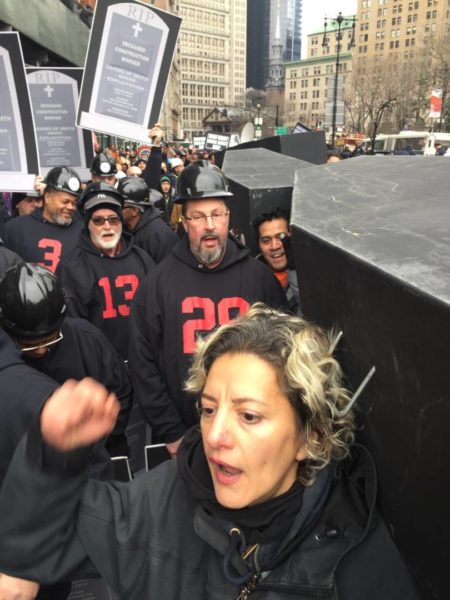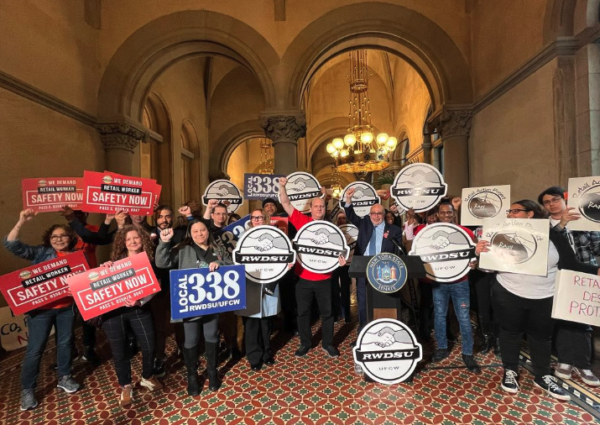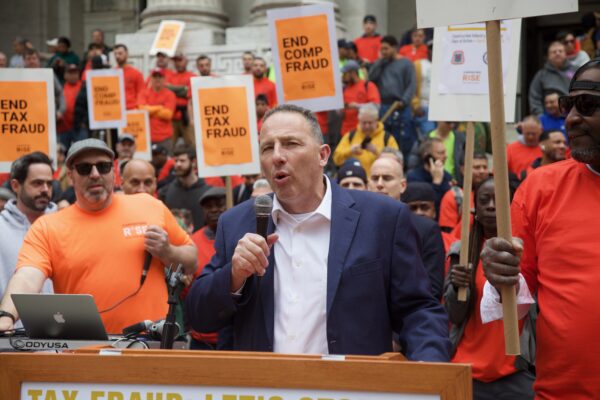New York, NY – It’s happened, again — another New York City construction worker left for work this week, and never made it home.

Brooklynite Jucong Wu, 33, died shortly before 9 a.m. Tuesday after plummeting nine stories down an elevator shaft at 111 East 24th Street — site of developer Sam Chang and McSam Hotel Group’s new 12-story, 130-room hotel rising between Lexington Avenue and Park Avenue South.
Wu’s death is the first construction worker fatality of 2018 — but it isn’t the first death to occur on a notoriously non-union Chang development in recent years. In 2014, falling concrete killed 27-year-old Jersey City resident Rodalfo Vasquez while he worked on a McSam Hotel Group development at 326 West 37th Street in September of that year.
Since 2015, more than 40 New York City construction workers have died on the job — most of them on non-union sites.
Last year, in response to rising construction worker carnage, the City of New York finally moved to put enhanced construction safety measures on the books. Intro. 1447-C mandated that construction workers now receive up to 55 hours of safety training, and penalizes contractors and developers who employ insufficiently trained workers.
Not surprisingly, the nearly omnipotent Real Estate Board of New York [REBNY], tried everything within its power to kill the measure. REBNY President John Banks said at the time, “The first concern is simple: does New York City have the adequate capacity to train up to 120,000 non-union construction workers? The answer to this question is just a simple — no.”
Worker advocates hailed the measure, however, but stressed that more also needed to be done to save the lives of New York City construction workers.
Last fall, following passage of Intro. 1447, Manuel Castro, executive director of New Immigrant Community Empowerment [NICE], told LaborPress that employers must be held directly accountable for maintaining safety standards.
“That’s a big part of the equation,” Castro said. “And we believe that this is a start in holding these employers accountable. More can be done and we’re going to be proposing more steps to be taken.”
On Wednesday, Eddie Jorge, a union organizer with the NYC Community Alliance for Worker Justice, also told LaborPress that the city needs to get tougher on callous contractors and developers.
“Once again we’re here mourning the death of a construction worker — [and the deaths will continue] until we start holding these contractors and developers accountable,” Jorge said. “A ten-thousand dollar fine is not enough. Is this small fine the price of doing business?”
Intro. 1447 originally outlined the formation of a Construction Safety Task Force. Building and Construction Trades Council head Gary LaBarbera, this week, called for that Construction Safety Task Force to be convened immediately.
“Once again, a construction worker’s life is tragically lost and a family is in mourning in New York City,” LaBarbera said in a statement. “After a fatality last month and now another today, we are asking the City to immediately convene the Construction Safety Task Force that was part of legislation passed in the City Council last year and address this out of control epidemic.”
A NYC Vital Signs report issued last summer, found that between 2007 and 20014, an average of 20 construction workers were killed in New York City annually

— most of them from falls.
“This is the umpteenth reason why every worker on a construction job needs to be represented by a union — and why all the building and construction unions and workers in this city should get on board the campaign to stop REBNY bullies, and the campaign to stop construction sweatshops,” REBNY critic Ray Rogers told LaborPress.
At the time of his death, Wu reportedly worked for an outfit, called U-Tek Elevator Inc., which was responsible for installing at least limited elevator service at the East 24th Street development.
For years, another piece of enhanced safety legislation has sought to raise training and education standards for elevator mechanics statewide.
But like Intro. 1447, the Elevator Safety Act faces fierce opposition from the same powerful real estate interests that wanted to nix enhanced safety standards for New York City construction workers.
“The only thing standing in the way of this common sense legislation are business interests in Albany that care more about protecting their bottom line than public safety, led by REBNY [Real Estate Board of New York] and RSA [Rent Stabilization Association], “Lenny Legotte, business manager, International Union of Elevator Constructors Local 1, said in response to Wu’s death.
More than 30 other states across the country have already enacted similar elevator safety standards.
“This latest tragedy on an elevator in New York City is further proof that we need our leaders in Albany to immediately pass the Elevator Safety bill, which would require more training and skilled union employees to work on our elevators,” Frank Spotorno, president, Park Avenue Elevator Designs,” told LaborPress. “I have been trying to get this bill passed for five years. How many more deaths do we have to have before it passes?”
Another worker doing repairs on a Queens apartment building, also died on the same day as Wu. According to authorities, 26-year-old John Davie was helping to renovate windows at 62-98 Saunders Street in Rego Park when he fell six stories to his death.




1 thought on “Death Continues to Stalk NYC Construction Workers in 2018”
Is there a charity or fund set up for families of the victims who die or are injured on the job? Looking to donate. Thanks!